

The Problem With Giving Math Tests Online and How Teachers Are Solving It. In the midst of the coronavirus pandemic, teachers have had to rethink pretty much everything they do with students—and that includes how they give math tests.
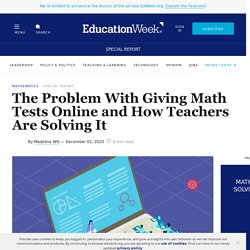
With many students working remotely, there’s no point in administering assessments that ask students to come up with a single answer; it’s simply too easy to cheat. Instead, teachers are focusing more on assessing students’ conceptual understanding of the mathematics—and they’ve had to do that without being able to gauge students’ body language or talk in person. These changes are especially prominent in schools that have remained completely remote, but they hold true even when students come to school a few days a week. Testing Students This Spring Would Be a Mistake (Opinion) This past spring, the U.S.
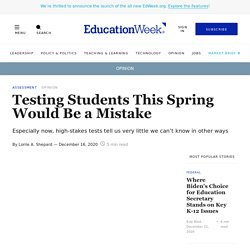
Department of Education gave states permission to cancel federally mandated state testing and accountability reporting because of pandemic-induced lockdowns. As the new testing season approaches, many advocacy groups are urging the department to reinstate testing requirements. As an assessment researcher who has studied both high-stakes statewide tests and very different classroom-assessment processes, I am alarmed when testing advocates claim that test data will automatically serve equity goals.
Advocates do not acknowledge any potential harm from testing for the very students in communities of color most traumatized by COVID-19. If the downsides were factored in, I believe most, even all, state tests would be canceled for 2021. Even under normal circumstances, high-stakes testing has negative consequences. How to Make Sure Grades Are Meaningful and Useful to Students. Slowly but surely, I started to identify some crucial mindset shifts that I had to make if I really wanted assessments to be meaningful.
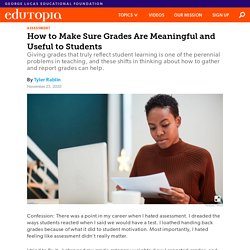
Assessments as Evidence of Learning The assessment doesn’t matter; the learning it reveals does. Twitter. Twitter. Mistakes Tell Us What Students Are Ready to Learn. Back in 2012, I had an idea for getting a bit better at teaching.
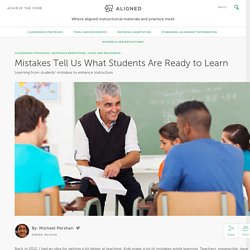
Kids make a lot of mistakes while learning. Teachers, meanwhile, have to quickly respond to those mistakes. I'd love to figure out how to combine your words with a simplified version of this @NCTM flowchart from Andrew G's post.… Shallowness (not Depth) of Knowledge. If you think others need to see this, share it on one of the sites below by clicking on the button.
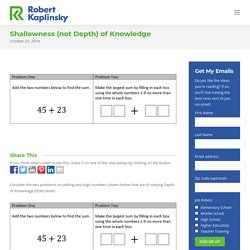
Consider the two problems on adding two-digit numbers shown below that are of varying Depth of Knowledge (DOK) levels: When I gave both of these problems to my then second-grade son (who is fortunately a mini-math geek like his dad), he quickly conquered Problem One with it providing no real challenge. When I showed him Problem Two, he got 98 + 76.
This is a great first answer, but it’s wrong. He knew which four numbers to use but the problem exposed a hole in his understanding of place value and gave me a great opportunity to ask him questions like, “What does the 9 represent? I’d make the case that the problem on the left is DOK 1 while the problem on the right is DOK 3 (more info here). This person made the case to me that while Problem One may not be rigorous, if a student uses a more advanced strategy, you could have a deep conversation about it. Allowing Test Retakes—Without Getting Gamed. Debates about exam grades and retaking tests tend to coalesce, eventually, around the same arguments. One faction prioritizes subject mastery, the idea that it’s more important to get students to take incremental steps towards proficiency than to punish them with bad grades.
The other side emphasizes personal responsibility, insisting that there are very few second chances in life, and that regular opportunities to retake tests simply teach kids that consequences are negotiable. But in a recent Facebook and Twitter poll about whether our teachers allow makeup tests, the discussion took a more practical turn. Most teachers agreed that retesting was sometimes appropriate, but expressed concerns about setting clear limits around the practice. Assessing Prior Knowledge: What Do Your Students Already Know? Designing a one-size-fits-all lesson assumes that every student is starting from the same point.
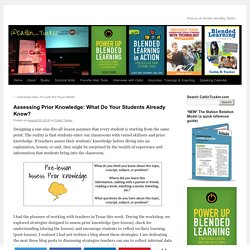
The reality is that students enter our classrooms with varied skillsets and prior knowledge. If teachers assess their students’ knowledge before diving into an explanation, lesson, or unit, they might be surprised by the wealth of experience and information that students bring into the classroom. I had the pleasure of working with teachers in Texas this week. During the workshop, we explored strategies designed to assess prior knowledge (pre-lesson), check for understanding (during the lesson), and encourage students to reflect on their learning (post-lesson). Depth of Knowledge Matrix - Elementary Math. If you think others need to see this, share it on one of the sites below by clicking on the button.
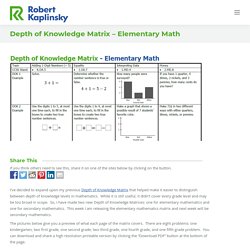
I’ve decided to expand upon my previous Depth of Knowledge Matrix that helped make it easier to distinguish between depth of knowledge levels in mathematics. While it is still useful, it didn’t cover every grade level and may be too broad in scope. So, I have made two new Depth of Knowledge Matrices: one for elementary mathematics and one for secondary mathematics.
What EXACTLY Is Depth of Knowledge? (Hint: It's NOT a Wheel!) Depth of knowledge.
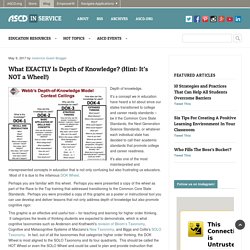
It’s a concept we in education have heard a lot about since our states transitioned to college and career ready standards – be it the Common Core State Standards, the Next Generation Science Standards, or whatever each individual state has decided to call their academic standards that promote college and career readiness. It’s also one of the most misinterpreted and misrepresented concepts in education that is not only confusing but also frustrating us educators. A Depth Of Knowledge Rubric For Reading, Writing, And Math. A Depth Of Knowledge Rubric For Reading, Writing, And Math by Terry Heick This is part 1 in a 3 part “Return To The Classroom” series, so-named because we, somehow, loathe the phrase “Back to School.”
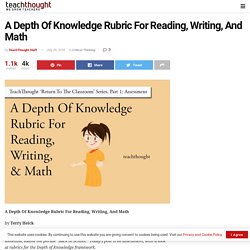
0210 Ed Leadership. What Is Performance Assessment? By The Editors Project-based learning is nothing new.
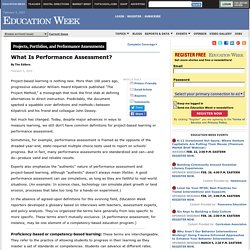
More than 100 years ago, progressive educator William Heard Kilpatrick published "The Project Method," a monograph that took the first stab at defining alternatives to direct instruction. Predictably, the document sparked a squabble over definitions and methods—between Kilpatrick and his friend and colleague John Dewey. Not much has changed. Today, despite major advances in ways to measure learning, we still don't have common definitions for project-based learning or performance assessment. Sometimes, for example, performance assessment is framed as the opposite of the dreaded year-end, state-required multiple-choice tests used to report on schools' progress. Exit Cards – What do yours look like? Classrooms that have moved toward a problem-based model often wrestle with the idea of individual accountability.
If we offer tasks that are worked on collaboratively, we need to make sure we learn more about how each individual student is thinking. To do this, one common practice is providing our students with exit cards at the end of the lesson. However, I wonder when we talk about terms like “exit cards” are we envisioning the same thing? Take a look at the following headings, and some sample exit card prompts.
Math Formative Assessment and Algebra Guide for Teachers. Accelerate algebraic thinking! Formative assessment is one of the most important ways to guide your students in their mathematics learning and success. Formative assessment can be the pathway to breaking through what is one of the most difficult areas for math learners: algebra. The shift from the concrete world of computation to the abstract world of algebra can be daunting for many learners—and their teachers.
Algebra’s importance as a gatekeeper course and high school graduation requirement has made it an important aspect of access and equity, the earlier learners start the better. Edutopia. Measuring What Matters. Dipsticks: Efficient Ways to Check for Understanding. What strategy can double student learning gains?
According to 250 empirical studies, the answer is formative assessment, defined by Bill Younglove as “the frequent, interactive checking of student progress and understanding in order to identify learning needs and adjust teaching appropriately.” Unlike summative assessment, which evaluates student learning according to a benchmark, formative assessment monitors student understanding so that kids are always aware of their academic strengths and learning gaps. It also helps teachers improve the effectiveness of their instruction. “When the cook tastes the soup,” writes Robert E. Stake, “that's formative; when the guests taste the soup, that’s summative.” Alternative formative assessment (AFA) strategies can be as simple (and important) as checking the oil in your car—hence the name “dipsticks.” 60-Second Strategy: This 5-minute check-in provides students an alternative way to show what they know—especially helpful for those who struggle on tests.…
Finding Clarity in Assessment and Grading. A recent Edutopia article about the question of zeros in classroom assessment set off a passionate debate filled with differing philosophies: “Kids need to learn how the real world works!” “One zero shouldn’t tank a kid in a whole class!” “There’s no reason not to let kids redo work until they demonstrate mastery!” “If we let them redo the work, they’ll never learn about deadlines!” Teachers also discussed practices like dropping a student’s lowest grade, allowing homework passes, and grading homework solely for attempt. As universities drop SAT and ACT requirements and depend more heavily on students’ grade point averages for admissions decisions, it’s more important than ever for educators to gain clarity around our assessment philosophies and how they impact our assessment, evaluation, and grading practices.
Separating Assessment, Evaluation, and Grading. Is Depth of Knowledge Complex or Complicated? - Robert Kaplinsky. If you think others need to see this, share it on one of the sites below by clicking on the button. Only a few months ago, I used the words “complex” and “complicated” interchangeably as synonyms for “difficult.” Recently I learned about the differences between their meanings and I now see their significance everywhere, especially in math education. Teaching to the Beat of a Different Drummer.
This post is the third in a series where I’m sharing how I’ve changed the ways that I look at assessments and assessment data. In the first post, I shared the importance of digging into the questions, not just the standards they’re correlated to.In the second post, I talked about how understanding how a test is designed can help us better understand the results we get.In this post, I’d like to share one of the ways I’ve learned how to analyze assessment results. Teaching to the Beat of a Different Drummer. 15 Ways to Check for Understanding. Nothing’s worse than being met with a sea of blank faces at the end of a lesson.
MobilePagedReplica. What does “Assessment Drives Learning” mean to you? There are so many “head nod” phrases in education. You know, the kind of phrases we talk about and all of us easily agree upon that whatever the thing is we are talking about is a good thing. For instance, someone says that “assessment should drive the learning” in our classroom, and we all easily accept that this is a good practice. Exit Cards – What do yours look like? MobilePagedReplica. Your browser isn't supported. 10 Assessments You Can Perform In 90 Seconds. 10 Assessments You Can Perform In 90 Seconds by TeachThought Staff. 6 Types Of Assessment Of Learning. The Effectiveness of Direct Instruction Curricula: A Meta-Analysis of a Half Century of Research - Jean Stockard, Timothy W. Wood, Cristy Coughlin, Caitlin Rasplica Khoury, 2018. ALN Formative Assessment Feb 2017 jl 560681 7. Nctm.
PARCC MATHEMATICS OPERATIONAL EVIDENCE STATEMENTS - Google Sheets. Why iReady is Dangerous – Math Exchanges. This school year Fairfax County Public Schools, the 10th largest school division in the United States, adopted the iReady assessment as a universal screener across all of its elementary schools. Students in grades K-6 take these assessments individually on the computer three times per year, and the results are made available to both teachers and parents. Kathy richardson amc benchmarks. Meet the #SinglePointRubric. A Depth Of Knowledge Rubric For Reading, Writing, And Math. Exit Cards – What do yours look like? Using Data to Plan Effective Math Remediation. Let’s face it–data is everywhere. In a school setting, the data that drives our instruction comes from assessments, which we usually classify as either formative or summative.
Beware of the Test Prep Trap — Newsela Blog. 12 Must-Read Articles About Assessment - Teaching to the Beat of a Different Drummer. #DOKchat - DOK is Hard Let's Talk About It. Robertkaplinsky. Depth of Knowledge Matrix - Elementary & Secondary Math - Robert Kaplinsky. Starting where our students are….. with THEIR thoughts. 8 Of The Most Common Sources Of Formative Assessment Data. 6 Reasons to Try a Single-Point Rubric. Who Makes the Biggest Difference? – Thinking Mathematically. Pick a Quote – Thinking Mathematically. Beginning of Year Assessments: What Do We Want To Know? – Embrace the Challenge. Fantastic, Fast Formative Assessment Tools. 12 Must-Read Articles About Assessment - Pick a Quote – Thinking Mathematically. 8 Frequent Sources Of Formative Assessment Data.
20 Simple Assessment Strategies You Can Use Every Day. How To Create Higher DOK Problems - Robert Kaplinsky. How Do You Get to School? Edutopia. Using Webb's Depth of Knowledge to Increase Rigor. What does “Assessment Drives Learning” mean to you? – Thinking Mathematically. Ww2.kqed. Who Makes the Biggest Difference? – Thinking Mathematically. 60 Non-Threatening Formative Assessment Techniques. How do you give feedback? – Thinking Mathematically. How to Answer Multiple Choice Questions – Thinking Mathematically. What Is Formative Assessment? - Carousel Videos - Education Week Video – EdWeek.org. The Emotional Weight of Being Graded, for Better or Worse. Jay McTighe: Beware of the Test Prep Trap – Newsela Blog. Who Makes the Biggest Difference? – Thinking Mathematically. What Is Formative Assessment? Exit Cards – What do your’s look like? – Thinking Mathematically.
Learn About Formative Assessment With A Deep Dive. Eliminating Tests Through Continual Assessment. Why We Need to Move Away from SMART Goals and Towards New Forms of Classroom Assessment.